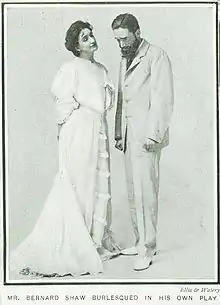Lillah McCarthy
Lillah Emma McCarthy (22 September 1875 – 15 April 1960) was an English actress and theatrical manager.
.jpg.webp)
Biography
McCarthy was born in Cheltenham. She studied elocution under Hermann Vezin and Emil Behnke, and made her first appearance on the stage in 1895. She joined Wilson Barrett at the Lyric, London, in 1896–97, and after touring in Australia in the same company as her brother Daniel, and Maud Jeffries, she became leading lady with him in 1900, playing in Quo Vadis?, The Sign of the Cross, Knowles's Virginius, Hamlet, and Othello. She then accompanied Barrett to South Africa and Australia. In 1904 she played with Beerbohm Tree at His Majesty's Theatre in the adaptation Agatha by Mrs Humphry Ward and Louis N. Parker from her 1903 novel, Robert Buchanan's A Man's Shadow, and Julius Cæsar. Subsequently, she appeared in Man and Superman (1905); Maurice Hewlett's Pan and the Young Shepherd (1906); Arms and the Man (1907); What Every Woman Knows (1908); John Galsworthy's Strife (1909); Maugham's Grace (1910); John Masefield's The Tragedy of Nan (1911); Twelfth Night (1912).
She assumed the management of the Little Theatre,[1] John Adam Street London, in 1911, and was associated with her husband in the management of the Savoy in 1912. In 1915 she played with her husband's company at Wallack's Theatre in New York City in Androcles and the Lion, A Midsummer Night's Dream, Anatole France's The Man Who Married a Dumb Wife (translated by Curtis Page), and The Doctor's Dilemma, and at various colleges in outdoor performances of Euripides' The Trojan Women and Iphigenia in Tauris.
Personal life

She married Harley Granville-Barker in 1906. They divorced in May 1918. She married Frederick Keeble, a botanist, in 1920.
Partial filmography
- Masks and Faces (1917)
- Mr. Wu (1919)
References
| Wikimedia Commons has media related to Lillah McCarthy. |
- "AMERICA THE HOPE OF THE DRAMA; Miss Gertrude Kingston, Who Manages a Theatre in England ...". NY Times. 17 March 1912. The Little Theatre, John Adam Street, was founded by Gertrude Kingston and had a seating capacity of about 400.
This article incorporates text from a publication now in the public domain: Gilman, D. C.; Peck, H. T.; Colby, F. M., eds. (1905). New International Encyclopedia (1st ed.). New York: Dodd, Mead. Missing or empty |title= (help)
